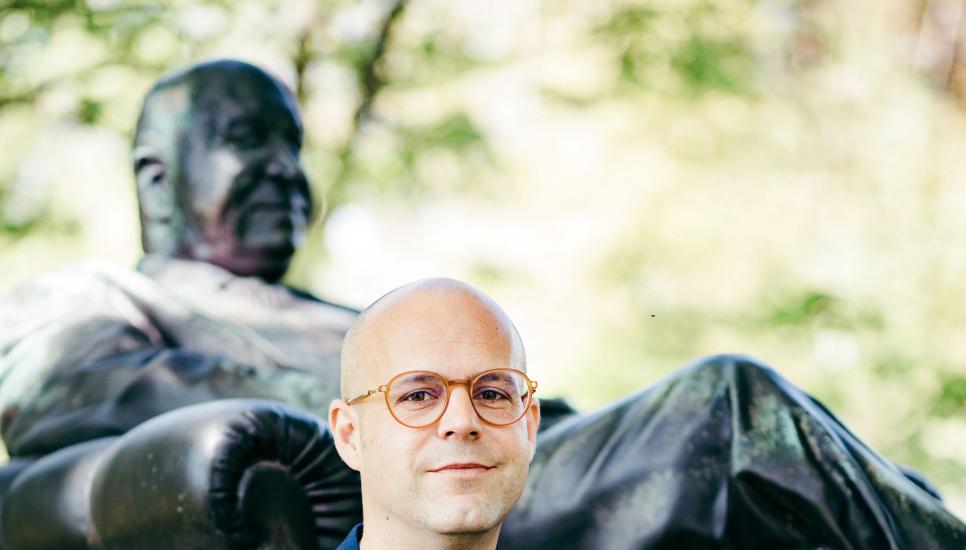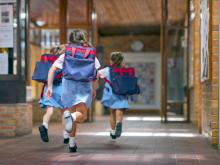Bernhard Gademann on how Institut auf dem Rosenberg teaches family business entrepreneurs

Bernhard Gademann says his family’s elite Swiss private boarding school, Institut auf dem Rosenberg, is run like a 132-year-old startup, with the skills and attitudes of entrepreneurialism nurtured in students in a state-of-the-art, holistic learning environment.
Institut auf dem Rosenberg, based in St Gallen, responded to the outbreak of Covid-19 and lockdown restrictions in the same entrepreneurial spirit that its faculty of “artisans of education” encourage in its international 6 to 18-year-old students—leading by example.
“When we talk about entrepreneurial thinking, that is not necessarily an obligation for somebody to found their own business,” Gademann said.
“It means taking responsibility for your area in life, to further that area, to develop it, to take risks and to create something beautiful. We want to instil the excitement of your own ability.”
Founded in 1889, Rosenberg has always taken an individual approach to education, enabling enviable academic performance. Since 2016, the school has run more than 100 “Talent and Enrichment” co-curricular courses, which are designed to broaden young minds and nurture their creativity.
 Gademann said Rosenberg was the first school in Switzerland to analyse the coronavirus situation in March 2020. Rosenberg applied its entrepreneurial spirit to the disruption by introducing a timetable spanning all time zones and switching all lessons to video conferencing. But with an important difference, he said.
Gademann said Rosenberg was the first school in Switzerland to analyse the coronavirus situation in March 2020. Rosenberg applied its entrepreneurial spirit to the disruption by introducing a timetable spanning all time zones and switching all lessons to video conferencing. But with an important difference, he said.
“Many schools offered online learning, but it was basically a check-in, where children download the exercise for the day, then they’re left on their own to solve it, then upload it again. All our classes were live with video conferencing software. We managed to pull this off in two working days.
"We got the team together; we had a committee to share best practice because some of our artisans had already experienced teaching online. We opened a support desk for parents and students to call in, in case of any technological difficulties.”
Rosenberg began teaching online, but staff knew they did not want students to fall behind, therefore the school invited the whole cohort back for summer.
“We basically moved the whole trimester into the summer and opened a summer school, which again took some entrepreneurial flexibility,” Gademann said.
“We also had the chance to come up with a detailed safety concept to make provisions for any eventuality this crisis would possibly throw at us. We have since been teaching on the ground and I would say we’ve mastered this crisis quite well.
"The most important message, not only to our students, but also to our artisans, is life will throw adversity at you. It’s just a question of how we deal with it. I’m tremendously proud of the school community, our students and parents for the support – and of course the artisans who pulled this off and seized this opportunity.”
With the startup mentality popular among young people, the advent of the smart technology-driven Fourth Industrial Revolution and its determination to keep ahead of teaching trends, the school worked with Euromonitor International in the past year to produce a new report on what entrepreneurship looks like for the next generation. From the study, Euromonitor recognised five key personas that will shape future entrepreneurs: The Innovative and Agile Leader, The Purpose-Driven Leader, The Multicultural Leader, The Lifelong Learner and The Emotionally Intelligent Leader.
With this in mind, CampdenFB asked Gademann how Rosenberg is preparing its students from business families to take the lead as the next generation into an era of uncertainty.
Which family business qualities will endure in 21st century entrepreneurship and which qualities should be adopted?
“I believe any successful family business is based on values and most likely if they're endurable values, they are sustainable values and perpetual values. Every entrepreneur joining the family business should embody these values. At the same time, we can see—due to the development of the world and what's happening with the industry in this disruptive time—there are a few key qualities that stand out. These include empathetic leadership with the ability to think in interconnected ways; creativity, which is essential for finding good new solutions for new problems for new challenges and the ability to collaborate. Collaboration has always been important, but will be key when it comes to brands pooling their expertise to create even stronger propositions.
And finally, one of the key topics of our times is sustainability, which I believe will play an important part in everything our graduates from Rosenberg will bring to any project in their lives as future entrepreneurs.
 Which emerging industries and professions should next-generation entrepreneurs focus on?
Which emerging industries and professions should next-generation entrepreneurs focus on?
There are two ways of thinking about it. There is the entrepreneur who enters a family business, which requires a specific skill set. Then there are the startup entrepreneurs. I don’t think there will be many business models that will not prioritise technology, partnerships, incorporating a global point of view and combining local solutions—particularly for those who join a longstanding traditional enterprise.
They must take the industry they're in and then develop their product proposition or venture out into new business areas. For that, they need to embrace disruption, to lead change management, to maintain a level of healthy risk-taking. Something we often observe in second, third, fourth generation of families running business is that they become averse to risk because they have the narrative of previous generations, which is something we always encourage.
 Is technology an essential component of 21st century education?
Is technology an essential component of 21st century education?
You don’t need to be passionate about technology. What is important for us is when we expose students to technology, that they are aware of the possibilities of what that technology might bring to existing business models and how it will aid or possibly create new obstacles in the future.
When we think about data industries, the world has become such a dynamic place. In our parents’ generation, somebody would have a great business idea, they would implement that business idea and they'd run it for 30 years. Nowadays, even well-established family businesses will have to reinvent their business model at least every five years and, possibly in the future, even shorter, just to make sure they stay relevant because the life cycle of products and services has drastically reduced.
 What is motivating Rosenberg’s young entrepreneurs?
What is motivating Rosenberg’s young entrepreneurs?
I think activism is a key point of young people’s lives today. I believe the generation we’re educating now is the first to be truly enlightened. Education, technology and the availability of information has made that possible and that is a beautiful thing. The key issues for them are sustainability and equality. This generation has such a profound sense of human rights that any injustice for them is almost unbearable.
When it comes to sustainability at Rosenberg, one of the projects in the Future Park is a simulation of the climate in Switzerland in 2085. We do this in collaboration with ETH Zurich and their spin-off YASAI, which is a sustainability organisation. We purchased wind trees from a startup in France which produces electricity for vehicles. A lot of these initiatives have been encouraged by students.
The key point about sustainability and philanthropy that our students have learned is that most people don’t want you to donate your old stuff or ‘charity tourism’ which produces carbon emissions and destroys local businesses. Communities want you either to support them through leveraging your financial networks.
For example, our students collected enough money last school year to finance 40 girls in Cambodia to go to school for an entire year, so they’re making a real impact, using their network and leverage to deliver it. Recently we partnered with a school in Soweto, South Africa based on a student initiative. Such projects have a much more scalable approach, which is the way it should be.
How does Institut auf dem Rosenberg future-proof its education, if, as the report estimates, 65% of primary school children today will work in jobs that do not yet exist?
We do so by working with partners which ensure our education remains relevant. If we get industry experts and researchers here and expose our students to interesting start-ups, then we ensure that their education is not only assimilation, which is a key issue with traditional education, but it is contextualised. Our students react to this well, it’s motivating and interesting for them, but they also get an understanding of what industries and businesses need today.
We have industrial partners, including Boston Dynamics and VITRA, and we work in the field of design with the Norman Foster Foundation. We have collaborations with ETH and different spin-offs from universities, such as YASAI which focuses on the development of sustainable agriculture and vertical gardening.
 There’s a big world out there to explore and something that fits every student. Our middle school students worked on developing a prototype, together with YASAI, for vertical farming that is exclusively produced with 3D printers. They worked in groups, presented their prototypes, then they picked one and continued to develop it together. Students see how all these aspects of collaboration, prototyping and taking a risk only comes by actually having hands-on experience.
There’s a big world out there to explore and something that fits every student. Our middle school students worked on developing a prototype, together with YASAI, for vertical farming that is exclusively produced with 3D printers. They worked in groups, presented their prototypes, then they picked one and continued to develop it together. Students see how all these aspects of collaboration, prototyping and taking a risk only comes by actually having hands-on experience.





